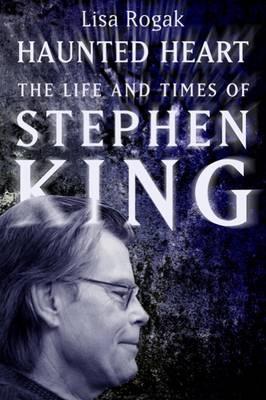 By LISA ROGAK (Thomas Dunne Books; 2008)
By LISA ROGAK (Thomas Dunne Books; 2008)
A decent but ultimately superfluous biography of the one and only Stephen King. To be sure, the book is well researched and readable, even if it is unauthorized. As claimed by author Lisa Rogak, King declined to take part in the project because he feels his life just isn’t that interesting, and after reading this book I’ll have to say he’s not entirely incorrect. Sure, King’s Horatio Algier-esque rise from penniless scribbler to bestselling novelist is inspiring, and his many fears and insecurities fascinating, but the life of a writer (even a rich one) is taken up largely with writing, which isn’t the most exciting of activities.
One thing Lisa Rogak makes clear in this book is that, contrary to what Stephen King is always claiming in interviews, her subject is NOT a “normal” guy. His penchant for writing horror, Rogak claims, stems from an unsettled childhood dominated by a missing father who went out for cigarettes one day when Stephen King was a young child and never returned. This led to years of poverty that left King with innumerable phobias that lingered throughout his life. He also developed an obsessive work ethic, with his claim that the only days he doesn’t write are the Fourth of July, his birthday and Christmas being a flat-out lie—he actually writes every day.
King’s early writing years were even more impoverished than his childhood, which made the $400,000 he received for CARRIE’S paperback rights all the more welcome. Success did not, alas, curb King’s alcoholism and subsequent cocaine habit, which continued until the late 1980s, when his wife Tabitha threatened to leave him if he didn’t get clean. He did, and life seemed rosy until one day in 1999, when during an afternoon walk King was hit and severely injured by a distracted driver. This slowed down but didn’t halt King’s prodigious writing output, and before long he was back on the bestseller lists. The book ends with King’s sons Joe and Owen entering the writing trade themselves, his daughter Naomi becoming a lesbian minister(!), and King finding fulfillment by playing in The Rock Bottom Remainders, a rock band composed of middle-aged novelists.
Most of the points mentioned above were already covered, and much better so, by King himself in his nonfiction tome ON WRITING. The majority of HAUNTED HEART, in fact, doesn’t impart much you can’t get in a straight chronology of King’s life (of the type found on his website and in the final pages of this book). I will at least say this for Lisa Rogak: she’s admirably succinct in summarizing King’s stories and novels, resolutely refraining from judgment and, best of all, never giving away the endings.
